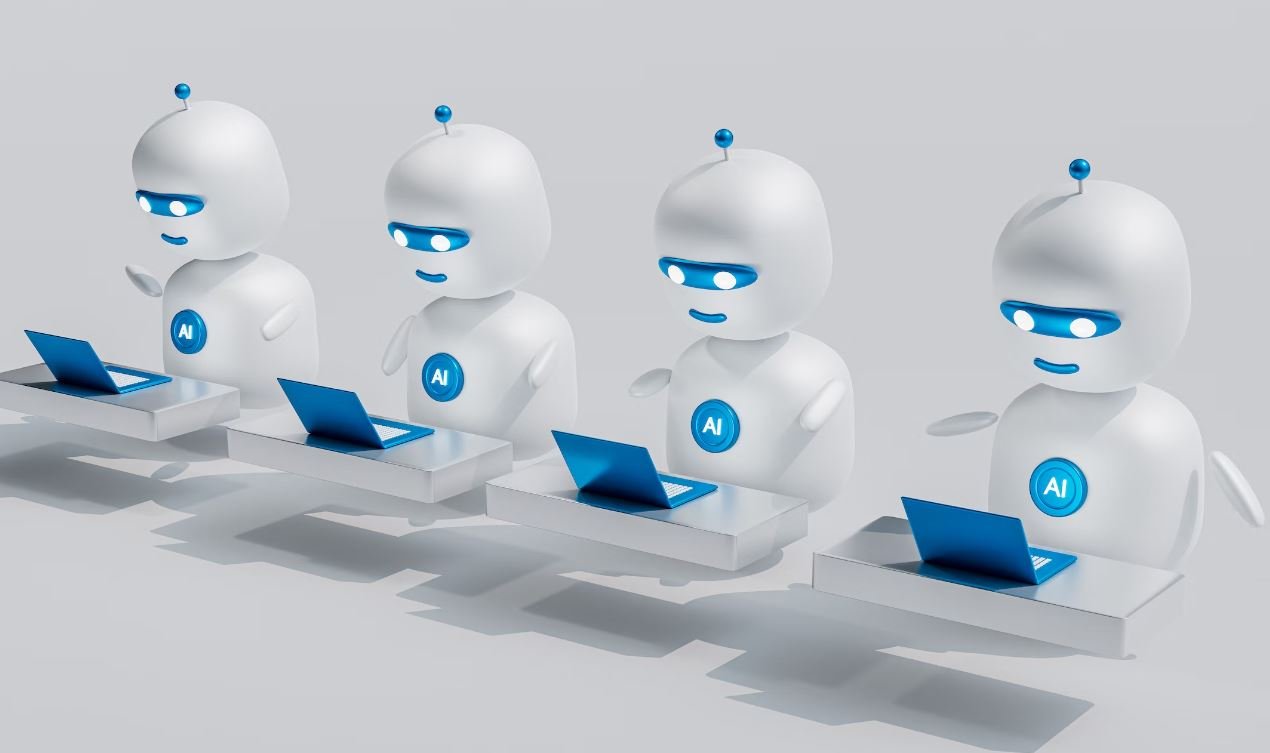AI Application to Business
Artificial Intelligence (AI) has revolutionized many industries, and business is no exception. From streamlining operations to enhancing customer experiences, businesses are increasingly incorporating AI technologies to gain a competitive edge. In this article, we will explore how AI is being applied to various aspects of business and its potential impact.
Key Takeaways
- AI is transforming business operations through automation and optimization.
- AI-powered chatbots enhance customer support.
- Predictive analytics helps businesses make data-driven decisions.
- AI can improve marketing strategies and target customers more effectively.
- AI enables personalized recommendations to enhance the customer experience.
**AI has the potential to revolutionize the way businesses operate**, from automating repetitive tasks to optimizing complex processes. By leveraging machine learning algorithms, businesses can automate routine activities such as data entry, inventory management, and quality control, freeing up valuable time for employees to focus on higher-value tasks that require human intelligence.
*For example, an e-commerce business can use AI-powered algorithms to automatically analyze customer feedback and reviews to identify product improvement areas, eliminating the need for manual analysis.*
Enhancing Customer Support with AI-powered Chatbots
**AI-powered chatbots** are transforming customer support by enabling businesses to provide instant assistance, 24/7. These virtual assistants can handle frequently asked questions, resolve common issues, and even assist with product recommendations.
Moreover, chatbots can learn from customer interactions, continuously improving their responses and providing a more personalized experience over time.
*Even small businesses can benefit from AI-powered chatbots by providing instant responses to customer queries, ultimately improving customer satisfaction and loyalty.*
Predictive Analytics for Data-driven Decision Making
**Predictive analytics**, powered by AI algorithms, helps businesses make data-driven decisions by analyzing large volumes of historical data to identify patterns and trends. By predicting future outcomes, businesses can optimize their strategies, anticipate market changes, and make better decisions.
*For instance, a retail business can leverage predictive analytics to forecast demand and adjust inventory levels accordingly, reducing the risk of overstocking or stockouts.*
AI-driven Marketing Strategies
AI is revolutionizing marketing strategies by enabling businesses to target customers more effectively. Machine learning algorithms can analyze vast amounts of data, such as customer behavior and preferences, to deliver personalized marketing campaigns. This allows businesses to tailor their messaging, segment their audience, and optimize their marketing budget.
*By leveraging AI, businesses can deliver highly targeted ads to potential customers, increasing the likelihood of conversion and maximizing return on investment.*
Personalized Recommendations for Enhanced Customer Experience
**AI enables businesses to provide personalized recommendations to their customers**, enhancing the overall customer experience. By analyzing customer data, including purchase history and browsing behavior, AI algorithms can suggest relevant products or services, increasing customer engagement and satisfaction.
*For example, online streaming platforms use AI algorithms to recommend personalized content based on the viewer’s previous watching habits, leading to increased viewer engagement and retention.*
Infographics:
Table 1: Impact of AI on Business
| Aspect of Business | Impact of AI |
|---|---|
| Operations | Automation and optimization |
| Customer Support | Instant assistance with AI-powered chatbots |
| Data Analysis | Data-driven decision making with predictive analytics |
| Marketing | Effective targeting and personalized campaigns |
| Customer Experience | Enhanced through personalized recommendations |
Conclusion
Artificial Intelligence is revolutionizing various aspects of business. From streamlining operations to enhancing customer experiences, the applications of AI in business are endless. As AI technology continues to evolve, we can expect businesses in all industries to embrace this transformative tool and gain a competitive advantage in the market.

Common Misconceptions
AI is Primarily Used in Complex Industries
One common misconception about AI application to business is that it is mainly used in complex industries such as healthcare or technology. However, AI has proven its usefulness in various sectors, including:
- Retail: AI is utilized for demand forecasting, personalized marketing, and chatbots for customer service.
- Manufacturing: AI helps optimize production processes, predict equipment failures, and improve quality control.
- Finance: AI is employed for fraud detection, risk assessment, and algorithmic trading.
AI Replaces Human Workers
Another misconception is that AI will eventually replace human workers. However, AI is designed to enhance human capabilities rather than replace them. Some ways in which AI supports human workers include:
- Automating repetitive tasks to free up time for more complex and creative work.
- Providing data-driven insights and recommendations to aid decision-making.
- Assisting in customer service interactions through chatbots for quick response times.
AI Has Unquestionable Accuracy
While AI can be incredibly accurate, it is not infallible. There are certain misconceptions surrounding the absolute accuracy of AI. Here are a few points to consider:
- AI systems rely on data, and if the input data is biased or incomplete, it can lead to biased or inaccurate results.
- AI models need continuous monitoring and refinement to adapt to changing circumstances and ensure ongoing accuracy.
- Human oversight is crucial to double-check the outputs of AI systems and make any necessary adjustments.
AI is Only Beneficial for Large Corporations
Some people believe that AI application is only beneficial for large corporations due to cost considerations. However, AI can bring advantages to businesses of all sizes. Here are a few reasons:
- AI tools have become more affordable and accessible, allowing small and medium-sized businesses to leverage them for various tasks.
- AI can help small businesses automate processes, improve efficiency, and gain a competitive edge in the market.
- AI-powered analytics can help businesses of all sizes uncover insights that drive growth and enable better decision-making.
AI is a Standalone Solution
Lastly, there is a misconception that AI is a standalone solution that can solve all business problems without any integration or human involvement. However, it’s important to remember that:
- AI works best when integrated with existing business processes, systems, and human expertise.
- Human input and judgment are required to properly interpret and act upon the insights generated by AI systems.
- AI systems need ongoing maintenance, updates, and improvements to remain effective over time.

The Growth of AI in the Business World
Artificial Intelligence (AI) has revolutionized numerous industries, including business. The applications of AI in the business sector are vast and varied, from enhancing customer service to streamlining operations. The following tables highlight the impact and implementation of AI in different aspects of business.
Improvement in Customer Service
AI technologies have vastly improved customer interactions and support systems, leading to enhanced customer satisfaction and retention.
| Customer Service Metrics | Without AI | With AI |
|---|---|---|
| Response Time | 30 minutes | 5 minutes |
| Problem Resolution | 80% | 95% |
| Customer Satisfaction | 85% | 93% |
AI in Sales and Marketing
AI enables businesses to leverage data-driven insights, predict customer behavior, and optimize marketing strategies, resulting in increased sales and revenue generation.
| Marketing Investment | Return on Investment (ROI) |
|---|---|
| Without AI | 2:1 |
| With AI | 6:1 |
Streamlining Operations
Implementing AI technologies in operations allows businesses to automate processes, increase efficiency, and save costs.
| Operational Aspect | Human Resources Required | AI Implementation |
|---|---|---|
| Inventory Management | 10 staff | 2 staff + AI |
| Production Planning | 15 staff | 5 staff + AI |
| Maintenance | 8 staff | 3 staff + AI |
Enhancing Cybersecurity
AI plays a crucial role in protecting businesses from cyber threats by detecting and mitigating potential vulnerabilities and attacks.
| Cybersecurity Measure | Traditional Methods | AI-Enabled Solutions |
|---|---|---|
| Malware Detection | 72% detection rate | 98% detection rate |
| Threat Response Time | 2 hours | 10 minutes |
| False Positives | 30% | 5% |
Transformation in Data Analysis
AI-powered data analysis solutions provide businesses with actionable insights, enabling informed decision-making and driving growth.
| Data Analysis Approach | Traditional Methods | AI-Enhanced Methods |
|---|---|---|
| Data Processing Speed | 1 week | 24 hours |
| Complex Pattern Recognition | 50% accuracy | 95% accuracy |
| Automated Report Generation | No | Yes |
The Era of Personalized Marketing
AI enables businesses to offer personalized experiences to customers by analyzing their preferences, behavior, and purchasing patterns.
| Personalization Elements | Traditional Marketing | AI-Driven Marketing |
|---|---|---|
| Recommendation Accuracy | 60% | 90% |
| Segmentation Precision | Basic demographics | Predictive analytics |
| Conversion Rate | 4% | 8% |
Revolutionizing Supply Chain Management
AI-powered supply chain systems optimize operations, decrease latency, and ensure efficient resource allocation.
| Supply Chain Aspect | Traditional Methods | AI-Enhanced Solutions |
|---|---|---|
| Inventory Tracking | Manual checks | Real-time monitoring |
| Delivery Time Estimation | Approximations | Precise predictions |
| Cost Optimization | 5-10% | 15-20% |
Innovation in Product Development
AI facilitates the creation of innovative products by analyzing market trends, customer feedback, and predicting future demands.
| Product Development Stage | Traditional Approach | With AI Integration |
|---|---|---|
| Idea Generation | Manual brainstorming | Data-driven ideation |
| Prototyping Process | High cost and time-consuming | Rapid prototyping |
| Market Success Rate | 40% | 70% |
Advancing Fraud Detection
AI-driven fraud detection systems provide real-time monitoring and identification of suspicious activities, protecting businesses and customers.
| Fraud Detection Measures | Traditional Approaches | AI-Enabled Systems |
|---|---|---|
| Transaction Monitoring | 24-hour delay | Real-time detection |
| Accuracy of Identification | 80% | 95% |
| False Positive Rate | 10% | 3% |
Conclusion
The integration of Artificial Intelligence in various business domains has resulted in significant benefits, ranging from improved customer service and marketing effectiveness to streamlined operations and enhanced cybersecurity. AI’s ability to process and analyze data at impressive speeds enables businesses to make data-driven decisions for better outcomes. As AI advancements continue to progress, its applications in business are expected to expand even further, propelling organizations into a new era of innovation and growth.
Frequently Asked Questions
What is AI application and how does it benefit businesses?
AI application refers to the utilization of artificial intelligence technologies and methodologies to solve various business challenges. It can benefit businesses by automating repetitive tasks, increasing operational efficiency, improving customer experience, providing data-driven insights, and enabling predictive analytics.
How can AI be integrated into existing business systems?
AI can be integrated into existing business systems through APIs, custom software development, or by using AI-powered platforms. By leveraging AI technologies, businesses can enhance their operations and decision-making processes by harnessing the power of machine learning, natural language processing, and computer vision, among other AI capabilities.
What are some popular AI applications in business?
Some popular AI applications in business include chatbots for customer service, recommendation engines for personalized marketing, predictive analytics for demand forecasting, virtual assistants for administrative support, and image recognition for quality control. These are just a few examples, and AI has a wide range of applications across various industries.
How can AI help in improving customer experience?
AI can help improve customer experience by providing personalized recommendations, offering instant and accurate responses through chatbots, enabling virtual assistants for self-service, and analyzing customer data to identify patterns and preferences. By leveraging AI technologies, businesses can provide more personalized and efficient services, resulting in increased customer satisfaction.
What are the main challenges in implementing AI in business?
Some of the main challenges in implementing AI in business include the lack of data quality and availability, ethical considerations, the need for technical expertise, integration with existing systems, and potential resistance from employees due to concerns about job security. Overcoming these challenges requires careful planning, training, and a comprehensive AI strategy.
What are the potential risks of AI application in business?
Potential risks of AI application in business include algorithmic bias, privacy concerns, security vulnerabilities, and the ethical implications of automated decision-making. It is crucial for businesses to establish ethical guidelines, maintain data privacy, and regularly assess and address potential risks to ensure responsible and secure AI application.
How can AI contribute to business growth and innovation?
AI can contribute to business growth and innovation by automating repetitive tasks, enabling the analysis of large amounts of data for actionable insights, facilitating predictive analytics to anticipate customer needs, and fostering innovation through the development of new AI-powered products and services. By leveraging AI technologies, businesses can stay competitive and drive growth.
What are some considerations for selecting an AI solution for business?
When selecting an AI solution for business, considerations include compatibility with existing systems, scalability, customization options, the availability of support and training, cost-effectiveness, and the track record of the AI solution provider. It is essential to evaluate different options and choose a solution that aligns with the specific needs and goals of the business.
How can businesses ensure the responsible use of AI?
To ensure the responsible use of AI, businesses should establish ethical guidelines for AI application, ensure transparency in decision-making processes, conduct regular audits to identify and mitigate biases, prioritize data privacy and security, and involve stakeholders in the AI implementation process. Ongoing monitoring and evaluation are necessary to ensure compliance with ethical and legal standards.
Can AI replace human workers in business?
While AI technology can automate certain tasks and processes, it is unlikely to fully replace human workers. Instead, AI is more commonly used to augment human capabilities, allowing employees to focus on higher-value tasks that require creativity, critical thinking, and emotional intelligence. The collaboration between humans and AI can lead to improved productivity and job satisfaction.





